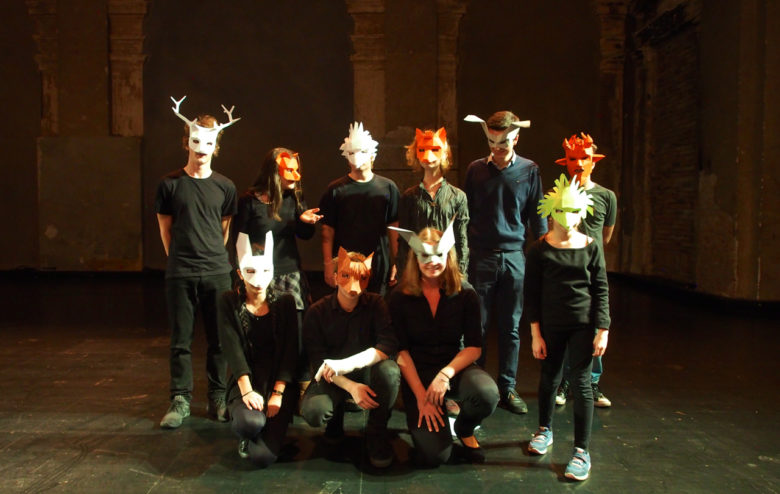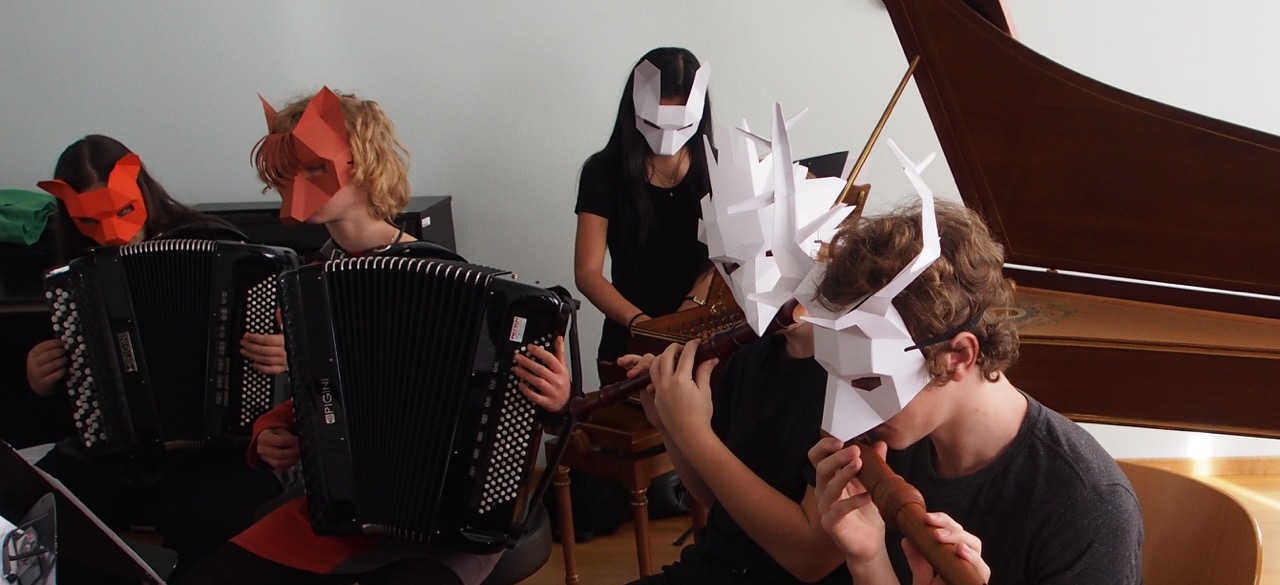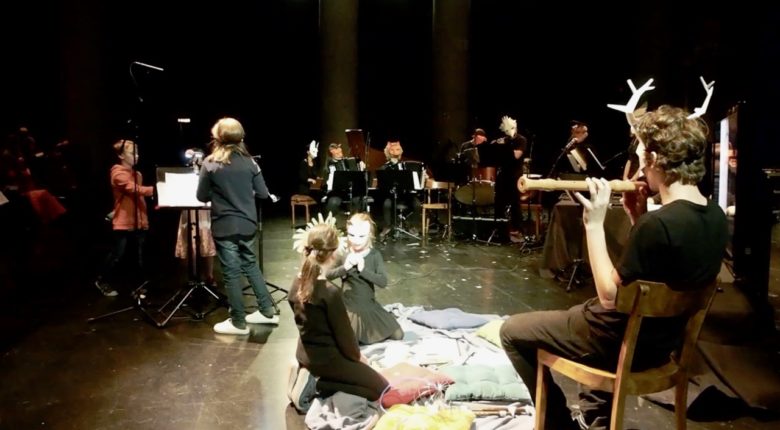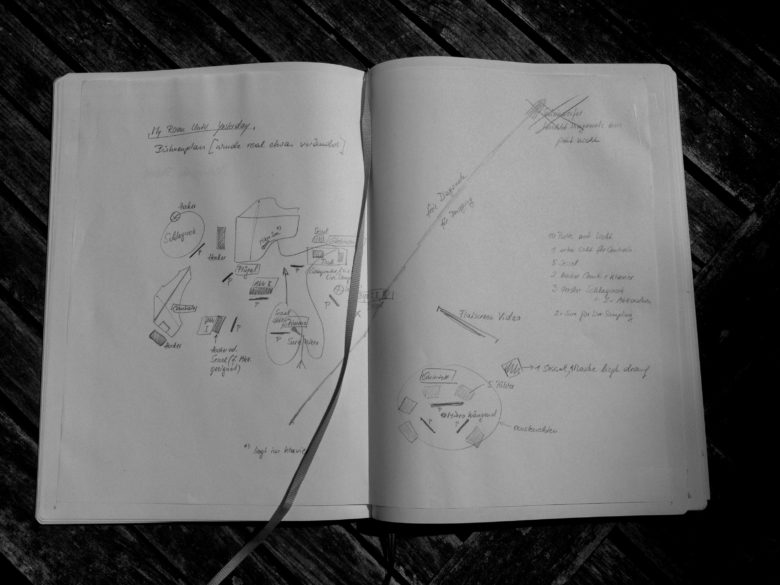MY ROOM, UNTIL YESTERDAY (2017)
Mein Zimmer, bis gestern
Music theatre, with people between 7 and 21 years
for voice, two ensembles, live-electronic, video
conception and direction: Pia Palme
composition: Pia Palme & Ensemble 22
duration 23 minutes
First performance as part of Junge Musik @ festival Wienmodern 2017
(curated and organised by Cordula Bösze and Michael Weber)
in cooperation with Musikschule Wien and IGNM
07/11/2017 Odeon, Vienna 19:00
The music was live recorded at the premiere by Thomas Lang.
All photos by Pia Palme.
Texts: Ensemble 22 & Pia Palme
Video: Benjamin Stolz & Pia Palme
Masks built in Kooperation with Wintercroft, UK by David Palme
Besetzung bei der Uraufführung:
Ensemble 22
Stimme: Clara Baudis [Klasse Equiluz, MS22]
Akkordeon: Pia Madlener, Lotta Klaus [Klasse Todorovski, MS2]
Klavier, Cembalo: Evelyn Seng, Martin Zottl [Klasse Banholzer, MS19]
Blockflöten: Benjamin Stolz, Florian Stolz [Klasse Palme, MS22]
Schlagwerk: Rafie Arsalan [Klasse Bergauer/Ramstorfer, MS22]
Elektronik: Felimy Loeschnig [Klasse Mayer, MS10]
Sopranblockflötenquintett 22
Alice Baumgartner, Mai-Chi Nguyen, Luis Kaupa,
June Tawfik, Marijka Bordiug [Klasse Palme, MS22]
The music theatre MY ROOM, UNTIL YESTERDAY was produced in cooperation with the Musikschule Wien and with students who learn an instrument in this institution. My idea was to bring my own practice as a composer and artist together with the playful musical of the students. I experience both sides as equal partners in the creative process. I found it important to have a strong conception of the of process working and a clear plan for the experimentation, but otherwise leave things open.
The topic MY ROOM, UNTIL YESTERDAY refers to the private space, the room (or part of a room) one occupies as a ‘young’ person, often in one’s parent’s home (or elsewhere). It refers to their own space or room: bed, table, chair, closet, bookshelf, clothes. In other words, the limited section of the world that is private while one is a student.
During school years, things constantly change: every season, there are new classmates, new classrooms, new teachers, new books, new topics, etc. New clothes – significantly, one grows and changes one’s physical appearance. The private space reflects these fast developments: bed, table, closet, chair… the furniture needs to grow and change, too.
Yet, memories linger in private space: memories of a former self. Memories of yesterday. A certain book, a T-shirt that is already too small to wear in public. A toy, that one only keeps as a memory. Every moment, time passes. Every morning, life is new, although the room looks like it did yesterday. Quite suddenly, things might become ‘old’: the toy, the book one had liked until yesterday seems to have changed over night. It has become outdated and ‘old’.
I found that both I myself and the young students could very well connect to this topic. Currently, being an ageing yet emergent ‘young’ composer, I feel like in a state of change, both physically mentally, as well as an artist. The topic covers our common grounds; from here, we could work together (there is a reference to Virginia Woolf, too).
The rehearsal period spanned from the end of September throughout October 2017. With some students, I met for private tutorials to work on contemporary performance techniques: with the percussionist, recorders, with the singer, with the pianists. The pianists also had a private tutorial with Joonas Ahonen, the pianist of the renowned Klangforum ensemble (it was amazing). Also, the teachers of the students supported the work, and some of them helped to rehearse.
Much of the music was created using a technique I would define as oral composition. In my experience, working with oral instructions works best with students of a younger age. They precisely remember whatever they hear, they play by ear, by heart, and by heard instructions.
During one of the first rehearsals, we collectively wrote texts, in reference to the main topic. From these texts, I compiled the libretto of the piece.
Kompositionsauftrag der IGNM Österreich.
Dank an das BKA Österreich für die Unterstützung der Kompositionsarbeit.
Dank an das Klangforum Wien für ein Klaviertutorial.
Dank an Wintercroft UK für die Kooperation und Unterstützung.
Dank an die Musikschule Wien 22 für die Unterstützung der Pobenarbeit.
Dank an die beteiligten Lehrkräfte der Musikschulen der Stadt Wien Milos Todorovski (MS2), Veronika Mayer (MS10), Eva Banholzer (MS19), Manfred Equiluz und Daniel Ramstorfer (MS22) für die fachliche Unterstützung.



